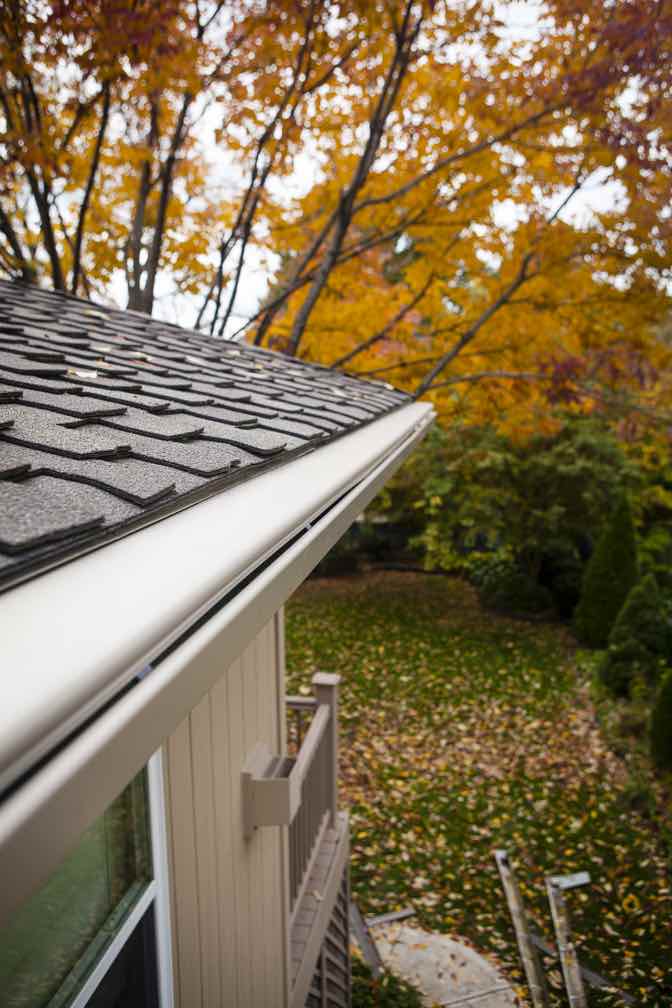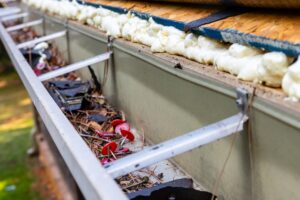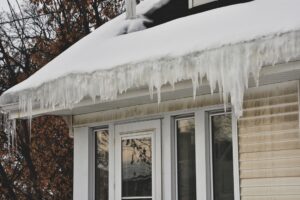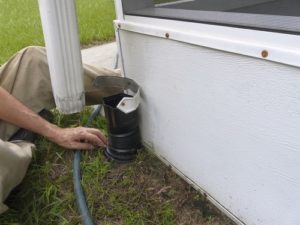 Your home needs gutters; without them, stormwater and meltwater wouldn’t be collected and carried away from your home’s roof and directed away from your home’s foundation. The result? A costly nightmare that could include damage to your home like a leaking roof, flooding, and the unimaginable – foundation damage.
Your home needs gutters; without them, stormwater and meltwater wouldn’t be collected and carried away from your home’s roof and directed away from your home’s foundation. The result? A costly nightmare that could include damage to your home like a leaking roof, flooding, and the unimaginable – foundation damage.
Luckily, if you purchase an older home, there’s a pretty good chance it already has a gutter system. If you purchase a new construction home, the builder may or may not have installed a gutter system. Whether your new home, be it older or younger, needs gutters replaced or needs them installed, there are plenty of options when you’re in the market for a new gutter system.
When you are researching gutter materials you’ll need to keep in mind how well it holds up in the climate you live in. Living in Colorado, we often experience severe weather regardless of the time of year. Spring and summer can bring severe thunderstorms with large, damaging hail while winter brings winter storms with the potential for large amounts of precipitation.
From steel to aluminum and everything in between, we’re going to explain the differences between gutter materials. Continue reading to learn which gutter material is best for your home so you can make the right decision that will complement your home and not break the bank.
Aluminum
Aluminum gutters are relatively common for two reasons: they’re usually low cost and they don’t rust, unlike some other metals. While they’re often available in many color options and can look good for many years, traditional aluminum gutters don’t hold up against all the elements.
While they will never rust, traditional open-top gutters will, unfortunately, show wear and tear easily. Thunderstorms that produce hail—small penny-sized or large golfball-sized hail—and high winds can wreak havoc on an aluminum gutter system. Likewise, winter storms that bring high amounts of precipitation can produce heavy snow and even ice dams that can damage your gutters. These severe weather patterns will leave dents in a traditional aluminum gutter system and can cause gutters to sag.
The K-Guard Leaf Free Gutter System is made of heavy-duty aluminum that’s extremely durable. Our aluminum gutter system is so durable that we include a lifetime paint, no clog, and no pull away warranty. What does this mean? Our gutters will never chip, dent, or sag, or pull away from the home. What makes our aluminum gutter system different than other aluminum systems is that ours is crafted from heavy-duty aluminum and is a complete system. Our system is also guaranteed transferable for the life of the home, something other gutter systems just can’t offer.
Copper
Copper, one of the oldest materials used for gutter systems, can be a good option for some homeowners. If your home is older and has vintage accents or if you truly love the look of aged metal then copper may be the best option for your home. You will, however, need to consider how much maintenance will be involved if you choose to install copper gutters.
Copper naturally ages when exposed to the elements and will slowly transform from that beautiful, shiny coppery gold color into a blue-green metal due to oxidization. While copper naturally resists algae and mold, the material will develop a tarnished look throughout the years. Copper gutters also tend to be more costly due to the demand for the material; on average they can be about five times more expensive than other gutter materials.
Steel
Steel gutter systems are available in two different finishes- galvanized and stainless. A galvanized steel gutter system, meaning it contains a protective layer made from zinc, is strong and durable, however, it will rust with time. The only way steel gutters won’t rust is if you purchase stainless steel gutters. While they are very durable, they are costly. Stainless steel gutters can cost up to four times more than other gutter materials.
While steel gutters are made from durable materials, they are prone to sagging if they don’t have a non-corrosive coating applied to them. Because steel can become warped from being exposed to heat and cold they tend to change shape and can sag. Living in a state like Colorado means extreme winters and warm summers. As a result, our gutter systems are constantly exposed to hot and cold, so use caution if you’re considering steel gutters.
Vinyl
Vinyl gutters have become increasingly popular due to their low cost and ease of installation. Although they’re on the more affordable side, especially compared to metal gutters, vinyl gutter systems won’t hold up as well or as long as other gutter materials.
Unfortunately, vinyl gutters are not a wise choice for homeowners that live in Colorado. We experience a lot of precipitation in a given year whether it be from snow or rain. Because vinyl gutters are so lightweight, they’re recommended for homes that are located in drier climates, not one where snow is a common occurrence.
While there are many different gutter materials available on the market, nothing can beat the durability of the K-Guard Gutter System. Colorado sees its fair share of extreme weather with fluctuating temperatures and large amounts of precipitation and the K-Guard Gutter System is the best choice for all homeowners.
If you’re in the market for a new gutter system and are looking for a durable, seamless, leaf-free gutter system, then schedule a free in-home estimate today. Our estimates include all the information you need to make an informed decision on installing K-Guard, including a thorough assessment of your home’s current gutter system. We proudly install the K-Guard Gutter System across the state of Colorado including, but not limited to, the following locations:



